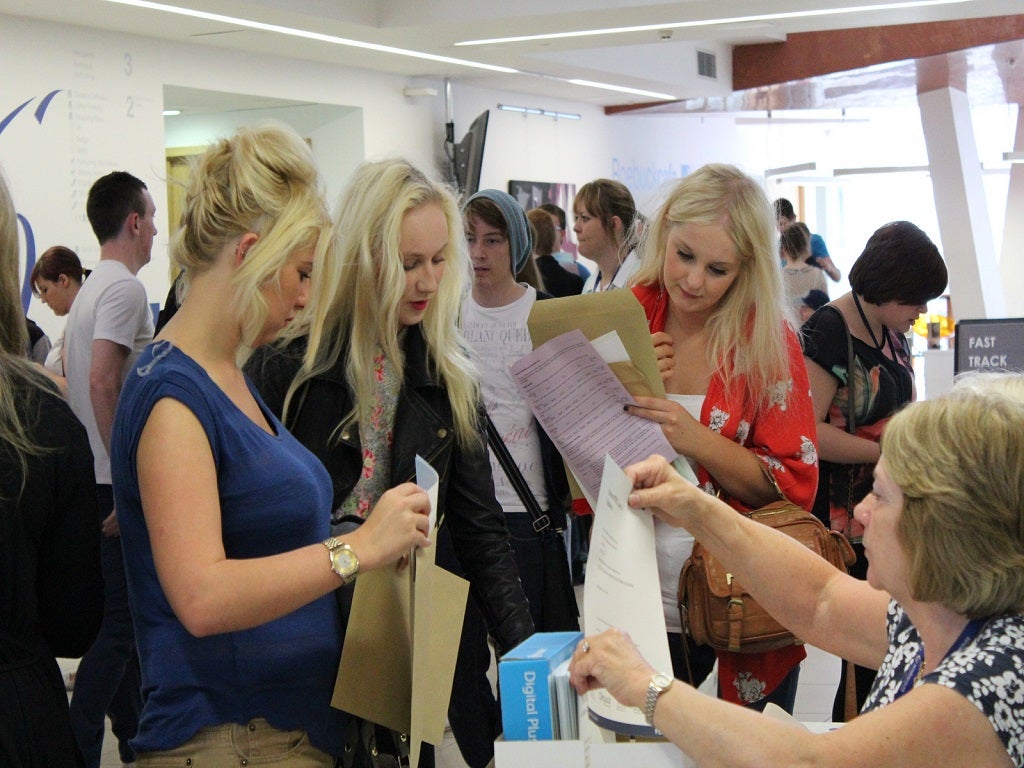Bright teenagers who miss their grades risk being 'squeezed out' of clearing places

Your support helps us to tell the story
From reproductive rights to climate change to Big Tech, The Independent is on the ground when the story is developing. Whether it's investigating the financials of Elon Musk's pro-Trump PAC or producing our latest documentary, 'The A Word', which shines a light on the American women fighting for reproductive rights, we know how important it is to parse out the facts from the messaging.
At such a critical moment in US history, we need reporters on the ground. Your donation allows us to keep sending journalists to speak to both sides of the story.
The Independent is trusted by Americans across the entire political spectrum. And unlike many other quality news outlets, we choose not to lock Americans out of our reporting and analysis with paywalls. We believe quality journalism should be available to everyone, paid for by those who can afford it.
Your support makes all the difference.With results day on the horizon, changes to university admissions could mean that bright teenagers who narrowly miss their grades find themselves “squeezed out” of coveted places.
As part of a higher education overhaul, there is now no limit on the number of students with an A and two Bs that universities can recruit, leaving them in competition to attract the best applicants. It is thought that around 115,000 able students who do better than predicted tomorrow will be offered last-minute places at leading institutions. Yet while the future looks bright for those who exceed expectations, universities risk facing a fine if they break strict number controls, giving them little flexibility for students who fall just below the cap.
Dr Wendy Piatt, director general of the Russell Group of 24 leading universities, said: "We hope this year's change to a lower threshold of ABB or equivalent will reduce some of the unintended consequences from last year when students who wanted to attend a leading university and had the right qualifications were not able to - even when those universities wanted to accept them.
8 very rich and famous people with crummy A-levels – or none at all
"One consequence of the uncertainties in the new system is that universities may have more places to offer through clearing to well-qualified students who have narrowly missed out on their first choice, or through the adjustment process for those who have done better than expected."
A senior lecturer in psychology at Buckinghamshire New University has encouraged less well placed students to accept their results and start investigating other options.
Dr Matthew Smith suggests moving on from failure and disappointment as quickly as possible: "Look to get it out of your system and look on the bright side. One of the first and most important steps is acceptance and accepting that you have not achieved what you wanted to achieve. This is not easy and can be quite challenging - it comes as a shock to people that they have not achieved what they wanted and immediately wish things had gone better.”
The general secretary of the Association of School and College Leaders, Brian Lightman, has argued that the 'very, very small' gap between grades could 'just be a slip of the pen as it were' and that B grades are still highly valuable.
Speaking in defence of alternative options to university, he said: “There's almost a growing backlash because of the inference, certainly from government, of A-levels as preparation for university to the exclusion of all else. For some students the decision will be, do I go to university or do I look at one of the many other employment routes?”
"I would say to those students (who miss out), step back and remember that you have still got really good qualifications that will give you lots of opportunities. You are still well placed to be successful in life."
Join our commenting forum
Join thought-provoking conversations, follow other Independent readers and see their replies
Comments